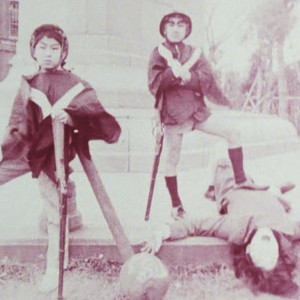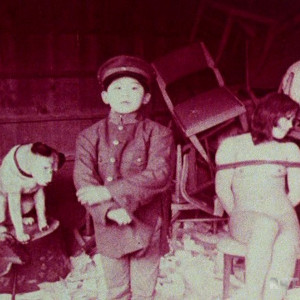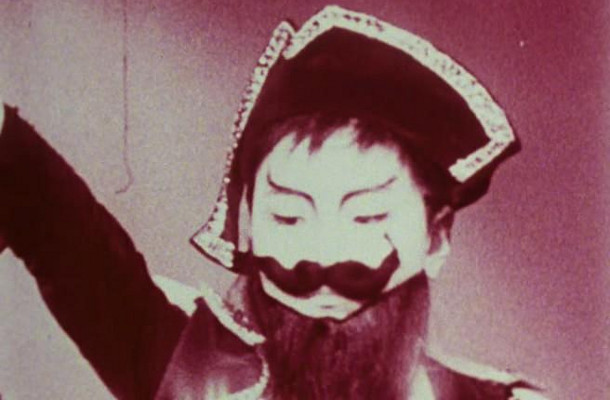
Subversive Saturday: Emperor Tomato Ketchup (1971)
Director: Shûji Terayama
Country: Japan
Genre: Experimental
Editor’s Notes: The following review is a continuation of Matthew Blevins’ Subversive Saturday series.
Emperor Tomato Ketchup is a revolutionary experimental film from Japanese filmmaker Shuji Terayama that juxtaposes nudity and political radicalism as logical bedfellows and uses the misplaced priorities of mainstream thought as weapons against society, condemning it for fearing its sexuality while engaging in the morally perverted acts of genocide and war. Audio cuts in and out until we are presented with a monolithic line drawing of a penis. Silent film visual sensibilities combined with pornographic imagery fill the pinkish tinted frames as voice reads the word of imperial law and warns of the deadly consequences of non-compliance. We rapidly move on to images of controversial thinkers and leaders throughout history, a hand crossing them out with giant black X’s in what could be interpreted as a visual representation of censorship and a as defiant rejection of the past and the figures that have lied and cheated their way to notoriety, their thoughts and words useless to youthful activists and nihilists.
The relics of knowledge and philosophy are exhibited center-stage as the young adults sit and smoke in Marlon Brando attire or confrontational nudity, both equally reprehensible in the eyes of Japanese traditionalists. The young willfully disregard these esteemed artifacts of knowledge, instead seeking new enlightenment that eschews the myriad of lies and compromises that combine to define safe and conventional modes of thought.
 The soundtrack switches to rock guitar as young soldiers take center stage, ready to execute martial law with a detached sense of nationalistic duty. Those images give way to washed out images that obfuscate controversial images through oversaturation, moving on to crisper images of a prison camp for teachers, children’s authors, toymakers, and juvenile officers forced into subservience through whipping and manual labor. A boy wears a navy uniform and admires himself in the mirror as he exhibits the parameters of heroics defined by jingoistic thinkers. The film constantly shifting focus in an unrelenting attack on the senses that doesn’t allow the mind to fully absorb what preceded in its wanton stream of consciousness style.
The soundtrack switches to rock guitar as young soldiers take center stage, ready to execute martial law with a detached sense of nationalistic duty. Those images give way to washed out images that obfuscate controversial images through oversaturation, moving on to crisper images of a prison camp for teachers, children’s authors, toymakers, and juvenile officers forced into subservience through whipping and manual labor. A boy wears a navy uniform and admires himself in the mirror as he exhibits the parameters of heroics defined by jingoistic thinkers. The film constantly shifting focus in an unrelenting attack on the senses that doesn’t allow the mind to fully absorb what preceded in its wanton stream of consciousness style.
The relics of knowledge and philosophy are exhibited center-stage as the young adults sit and smoke in Marlon Brando attire or confrontational nudity, both equally reprehensible in the eyes of Japanese traditionalists. The young willfully disregard these esteemed artifacts of knowledge, instead seeking new enlightenment that eschews the myriad of lies and compromises that combine to define safe and conventional modes of thought. A nude old woman sits on a Rube Goldberg contraption like a living dadaist art installation while a young man with a rifle studies the calamity to try and understand it and take a mental inventory of all the reasons he should be offended before he ultimately shoots.
The emperor has changed the definition of a cat in a meaningless semantic gesture while the discontented subversive mind yawns at the world and the silliness of politician’s meaningless propaganda aimed at distracting the public consciousness from weightier issues. Old men are chased out of town by members of the KKK. Children have taken over society in an act of martial law, marking everything deemed objectionable to the rule of law with a large X, painting over every available surface and damning all of society. They drag the decaying body of a dead old man from a building, creating a confrontational juxtaposition of imagery that seeks to provoke mainstream sensibilities by illustrating the absurdities of its own rules as the narrator continues to dictate imperial law. They play ping-pong over a nude bound woman, wearing the uniform of adults while playing childish games, but all children are subject to the whim of the rule of land and its strange arbitrary laws that serve the interest of a large but small-minded group, and obedient soldiers are ultimately the children of the governments they represent as they are denied free-will in their unwavering and unquestioning execution of national law.
A woman lounges in extravagant negligee and admires the contours of a vinyl record. She is interrupted by the entrance of a child soldier who has his way with her to her initial dismay and eventual acceptance. The child suckles the woman’s nipples and feigns oral sex, images that would be reprehensible to most of the “civilized” world could be easily recontextualized as a breast-feeding mother nursing her child. Though the boy may be perceived as too old for that act, but children nursing past toddler years is seen as a norm in some cultures. Any other sexual contact is merely inferred or the result of the imaginative extrapolations of the viewer.
It is not my place to judge the morality of the actions as they exist in cinematic perpetuity, I can only offer my interpretation of the artistic intentions behind these decisions.
 Bondage is a constant theme in Emperor Tomato Ketchup, but the bondage of thoughts and actions is ubiquitous to the radical mind. A dwarf chops the head off of a chicken and walks uncomfortably closer and closer to the camera as it initially attempts to back away, but his insistence on being acknowledged as human earns him a momentary closeup. Brief images of scatological foreplay give way to lounging women in kabuki makeup, eagerly awaiting another boy soldier, stripping him of his clothing as soon as he enters the door. Three naked women in large blond wigs surround the boy and accost him with simulated sexual contact, at one point leading to uncomfortable feigned intercourse that is intentionally designed to confront and shock even the most jaded and free-thinking individuals. It is not my place to judge the morality of the actions as they exist in cinematic perpetuity, I can only offer my interpretation of the artistic intentions behind these decisions.
Bondage is a constant theme in Emperor Tomato Ketchup, but the bondage of thoughts and actions is ubiquitous to the radical mind. A dwarf chops the head off of a chicken and walks uncomfortably closer and closer to the camera as it initially attempts to back away, but his insistence on being acknowledged as human earns him a momentary closeup. Brief images of scatological foreplay give way to lounging women in kabuki makeup, eagerly awaiting another boy soldier, stripping him of his clothing as soon as he enters the door. Three naked women in large blond wigs surround the boy and accost him with simulated sexual contact, at one point leading to uncomfortable feigned intercourse that is intentionally designed to confront and shock even the most jaded and free-thinking individuals. It is not my place to judge the morality of the actions as they exist in cinematic perpetuity, I can only offer my interpretation of the artistic intentions behind these decisions.
Gaining insight into the political consciousness of a subversive mind creates revolutionary and confrontational images, the taboo of sexuality and sexual acts that deviate from the norm addressed logically. If it can exist in the world then it should exist in cinema. Cinema should act as an impartial observer of every facet of humanity and not just those that conform to conventional modes of thought. The revolutionary filmmaker may be ineffectual at invoking social change, but it is only the revolutionary filmmaker that can define societal problems outside of the modes of conventional thought and capture their interpretation of these problems in a medium that lives and moves, illuminating the fallacies that are taken as fact and injustices that are accepted as law. Hazy images of a crucified Christ portrayed by a woman in loose garb may be the most objectionable image to some, the revolutionary mind’s perception of authority and the depiction of the military that executes and enforces that authority as children may be the most controversial image to others, no matter how displaced those priorities may seem to me when faced with the possibilities of child exploitation I have no direct power over the thoughts and beliefs of others. A Nazi torments a baker play strange games of chance and mutual assault for what could very well be the fate of the free world. They carry this on until they are barely able to stand, much in the way nations engage in war despite great domestic cost in one of humanity’s oldest past-times, and one that is far more profane than controversial filmmaking. The final frozen frame is of a young boy dressed as a naval captain engaged in a Nazi salute with stony-faced conviction. The determination captured in his eyes is perhaps the most frightening image of the film, the fate of humanity forever doomed to a constant state of self-destruction.
Related Posts
![]()
Matthew Blevins
![]()
Latest posts by Matthew Blevins (see all)


























